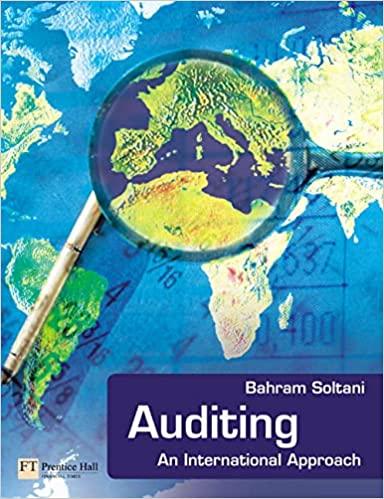Audit situations 1 to 10 present various independent factual situations an auditor might encounter in conducting an
Question:
Audit situations 1 to 10 present various independent factual situations an auditor might encounter in conducting an audit. For each situation, do the following:
(a) Identify which of the conditions requiring a modification of or a deviation from an unqualified standard report is applicable.
(b) Given your answers in part (a), state the appropriate audit report from the following:
■ unqualified opinion;
■ qualified opinion;
■ adverse opinion;
■ disclaimer of opinion.
Audit situations:
1 In performing the audit, you do not believe you had adequate access to important records of the company’s inventory. You conclude that there is a possibility that inventory is materially overstated. The client refuses to allow you to expand the scope of your audit sufficiently to verify whether the balance is misstated.
2 The financial statements present fairly, in all material respects, the financial position, results of operations, and cash flows in conformity with IFRSs or GAAP.
3 Company’s management no longer estimates its uncollectable receivables as each fiscal year end, preferring instead the direct write-off method. They argue that it is not material. You believe otherwise.
4 The company Yoon.com is an online start-up selling computer equipment. Although the company had a promising start, a downturn in e-commerce has led to sales and the cash position deteriorating significantly. You have reservations about the ability of the company to continue in operation for the next year.
5 The auditor was unable to obtain confirmations from three of the client’s big customers that were included in the sample. These customers wrote on the confirmation letters that they were unable to confirm the balances because of their accounting systems. The auditor was able to satisfy himself through other audit procedures.
6 Your client, Gamma & Co, has changed the method of depreciation from straight-line to declining balance. The effect on this year’s income is immaterial, but the effect in future years is likely to be material. The facts are adequately disclosed in footnotes.
7 In performing your audit of the Beta Corp for the second year, the management has decided to disclose an ongoing contingent liability in its financial statements for the first time. You have issued a qualified audit report in the first year mainly because of the client’s failure to make sufficient provision for this purpose.
8 Detailed accounts receivable records of Delta Ltd have not been maintained and certain records and supporting data were not available for the audit. The auditors were not able to satisfy themselves about the amounts at which accounts receivable and allowance for doubtful accounts are recorded in the company’s financial statements. The items of accounts receivable are material in relation to the company’s financial statements. The auditors were unable to satisfy themselves by the use of other audit procedures.
9 You are auditing Omega USA, Ltd, a subsidiary of a foreign company. The company reports its inventories, fixed assets, depreciation and cost of goods sold on a currentvalue basis. Such accounting policy violates the accounting standards of both the foreign country and the US. The effect of this departure from generally accepted accounting principles is quite significant.
10 You are auditing the accounts of Epsilon Inc. for the year 20x4. The company has purchased certain assets (machinery and equipment) from a corporation wholly owned by three stockholders and officers of the company at management’s estimate of their values at the date of acquisition. You are unable to obtain adequate documentation to support the basis and purchase price of such assets.
Step by Step Answer:






